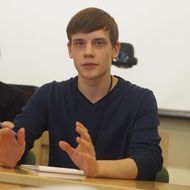HSE University-St Petersburg to Open New ‘International Relations’ Track in ‘Political Science and World Politics’ Programme
Starting in 2025, the Bachelor's programme ‘Political Science and World Politics’ at HSE University-St Petersburg will train specialists not only in political science but also in international relations. This will significantly increase graduates' career opportunities in analytics, diplomacy, and consulting. Learn more about the changes from the programme's academic supervisor and professors from the new track.

Responding to the Needs of the Labour Market
According to Aleksei Sorbale, Academic Supervisor of the Bachelor's programme 'Political Science and World Politics,' the modern labour market has increasingly high demands of university alumni. Educational programmes are shifting focus from classical political science, international relations, history or economics to the junction of several academic fields.

Aleksei Sorbale
Academic Supervisor of the Bachelor's programme 'Political Science and World Politics'
Recent trends in the Russian and international labour markets led us to reinterpret the programme's existing educational tracks. Modern employers look not for narrow specialists but for employees who can formulate the right questions for articulating managerial, business, and academic issues, provide empirically justified answers to given questions, and implement contextual knowledge and methodological skills.
Among the new tracks launching in the programme this year are 'Applied Policy Analysis for State and Business' and 'Applied Foreign Policy Analysis and International Consulting.' The academic supervisor underscored that these tracks are focused on practice. Their goal is to train specialists in the spheres of political science and international relations who will be able to study, analyse, and offer solutions to real problems typical to the academic sector, public authorities, and business.
The first two years of studies will be devoted to fundamental knowledge of political science and international relations. From the third year, students will study courses in their major.
'Separate tracks in international relations and political science significantly simplify the task of choosing a programme for applicants who are interested in both. Different focuses and course content in the new tracks will help students choose an area of study that meets their current interests and plans for the development of their professional and educational trajectories,' says Aleksei Sorbale.
What is the focus of the new tracks?
The track 'Applied Policy Analysis for State and Business' focuses on training students in analysing political and managerial decision-making and political programmes. For this purpose, students will study such disciplines as 'Political Analysis' and 'Methods of Political Decision-Making'.

Yury Kabanov
Senior Lecturer at the Department of Political Science and International Affairs
In general, each track offers an applied specialisation that is in demand in public administration and industry, where government relations specialists are much sought after.
The track 'Applied Foreign Policy Analysis and International Consulting' will cover international development and analysis of risks in foreign policy. Students will learn about the basics of cooperation between states and inter-state unions. The track curriculum includes such courses as 'History of International Relations,' 'Theory of Diplomacy,' and 'Negotiation Skills.' The track will train specialists capable of assessing risks and consulting governmental and private entities.

Marina Panikar
Associate Professor at the Department of Political Science and International Affairs
Students will learn how to conduct negotiations, from developing negotiating positions to behaving appropriately at official events. This kind of knowledge is relevant not only in diplomacy but also in business—things like the proper arrangement of items on a table and symbolism are of great importance to both high-ranking people and prominent businesspeople. All these things are important in traditional diplomacy. Despite any innovations and trends, it's vital to understand that the principles of international relations never change.
Competitive Advantages of the Programme
A Diploma with Two Concentrations
Students can choose one of two basic tracks depending on their personal interests and views of their future careers. At the same time, they have an opportunity to study courses from the second concentration and get a diploma in two areas of study. For instance, if a student majors in international relations, they can take up four basic courses on political science to get a diploma in two areas of study.
'A bachelor's graduate who has professional knowledge in policy analysis and the foreign policy environment of the studied region, who has mastered a whole set of specialised methods of data analysis and at least two foreign languages, is a perfect candidate for modern master's and PhD programmes. Of course, multidisciplinarity is important for employers in a great variety of labour segments,' the academic supervisor highlights.
Studies Fully in English
Studies are fully in English from the first year, which significantly increases graduates' competitive ability in the labour market.
Four Regional Tracks and a Choice of Second Foreign Language
Students have a choice between four regional tracks: Latin America, the post-Soviet space, the European space, and China. The curriculum includes study of the society, culture, and political system of the chosen region. Students of the programme can choose one of six foreign languages depending on their concentration: French, Portuguese, Chinese, German, and Spanish.
'We have plans to increase the number of regional tracks and languages. For our programme, one of the most actively developing directions of international cooperation now is India. We are discussing an opportunity to supplement our programme curriculum with courses on the history, culture, and social and political structure of India, and we are thinking about starting a Hindi language group. Countries in the Middle East and Africa are also of great interest, and we are planning to develop in this direction: starting with elective courses focusing on the Maghreb countries,' underscores Aleksei Sorbale.
Additional Opportunities
International academic mobility. The choice of foreign university often corresponds to the regional track. This helps students to study the culture and language on a deeper level, as well as gain a new perspective on their academic interests and career plans. Students currently go to Turkey, Italy, China, South Korea, and Malaysia, and the list will grow as relations with the Asian region develop.
Student Research Society of the Department of Political Science (SRS). This is a community of active students who work together on research, popular science, and public projects. SRS regularly holds methodological workshops and open lectures by famous speakers, and there are several active student research groups.
Career Prospects and the Programme's Partners
Students of the Bachelor's programme 'Political Science and World Politics' master practical skills and data analysis, international analytics, negotiating, and management skills. Theoretical knowledge is applied in real projects with the programme's partners.

Denis Stremoukhov
Senior Lecturer at the Department of Political Science and International Affairs
For several years, our students have participated in preparing the 'Open Government in Russia' report of the Accounts Chamber of the Russian Federation. Successful cases of cooperation with business include a project with the company Geropharm. Last year, even our first-year students took part in projects with several social-oriented NPOs. At the moment, we have a number of projects with the company Business Solutions and Technologies. We are now working to develop partnerships in the framework of the international relations track. Correspondingly, we will focus on organisations that deal with analytics in the sphere of international relations and external politics, as well as companies involved in international, cultural, and economic cooperation.
Plenty of our alumni find their place in the analytical departments of commercial and non-profit organisations. Students can pursue careers in public authorities and organisations which implement projects in the sphere of urban planning. Some graduates choose an academic path, enrol in master's programmes in Russia and abroad, and become professors at universities and researchers.
Alumni majoring in International Relations can find themselves in international business, expert and analytical activities, or the diplomatic sphere. According to Yury Kabanov, Senior Lecturer at the Department of Political Science and International Affairs, the programme trains specialists in international consulting and applied foreign policy analysis. 'In companies oriented at foreign economic activity, there is a demand for specialists who understand which new countries they can enter, why and how they should build relations.'
Admissions Rules in 2025
When applying, prospective students can choose one area of study: 'Political Science' or 'International Relations'. Each one has a separate competitive selection process, so applicants must pay attention to the corresponding entry scores and the availability of state-funded and fee-paying places. When choosing an additional track, the option of a double-degree diploma will be fee based. More details can be found on the programme website.

